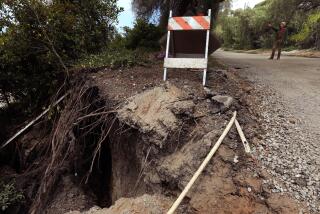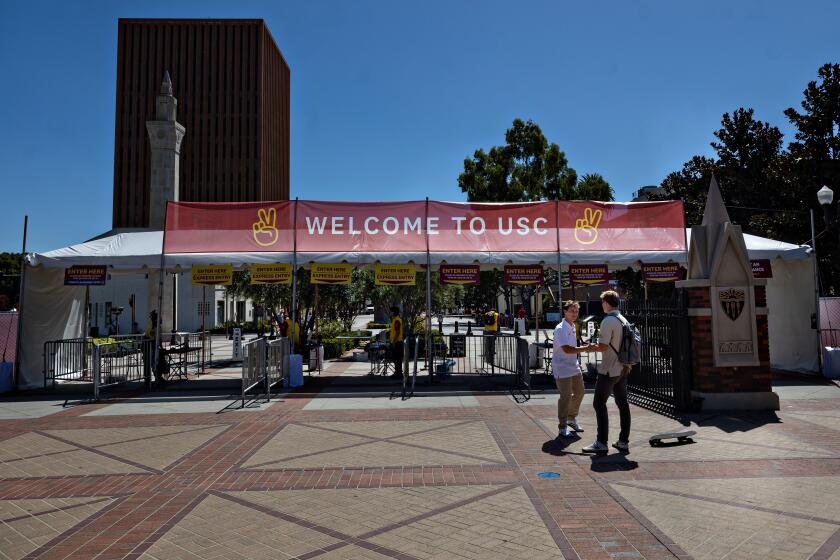Probe of Honig Begun by Lungren : Education: A spokesman for the attorney general said the office is ‘evaluating’ the educator’s ties to a program run by his wife.
Atty. Gen. Dan Lungren is investigating state Supt. of Public Instruction Bill Honig’s connections with the Quality Education Project, a successful parent-involvement program run by Honig’s wife, Nancy, out of the Honig residence in San Francisco, The Times has learned.
The inquiry centers on the possibility that Honig may have persuaded some California school districts to contract with QEP, instead of another parent-involvement program, and may have benefited personally as a result.
Dave Puglia, spokesman for Lungren, said the attorney general’s office is “evaluating” material about Honig and QEP but that an official investigation has not been launched.
However, sources close to the situation said an official “conflict-of-interest” inquiry already has begun and that some state Department of Education employees were questioned about the matter this week.
These sources said that if Honig did anything, either directly or by implication, to make school districts believe that QEP was the only viable parent-involvement program available, he might be guilty of conflict of interest.
The investigation is said to be particularly concerned with three or four school districts where the state Department of Education paid for either department employees or outside experts to help set up the QEP programs.
Investigators also are said to be looking into the possibility that Honig “steered” school districts to QEP and then profited by sharing in his wife’s salary as QEP president, which now is $108,000.
In a telephone interview from Washington, where he is attending an educational conference, Honig on Tuesday called the investigation a “tempest in a teapot.”
“I haven’t made a single phone call” on behalf of QEP, Honig said. “The worst thing you can tag me with is that I helped some districts get money for very fine services that were free and that were doing a lot of good for kids.”
The superintendent praised QEP for gathering together some “common-sense ideas,” like parents encouraging their children to read and making sure they do their homework, into a successful program that involves students, parents and teachers.
He said QEP is a “charity,” not a “business” and that his wife has raised almost $10 million for the program since 1982.
“They should be giving Nancy an award for raising $10 million for school kids,” he said.
QEP has become a major force in the “parent-involvement” field, where parents primarily in low-income families are encouraged to participate more actively in their children’s education.
More than 200,000 youngsters, most of them in elementary schools, are enrolled in the program. QEP is in 331 schools, mostly in California. The funds for QEP are raised from foundations and individual contributions. QEP provides all the funds necessary to run the program in some districts, while other districts pay for all or part of the program with their own funds.
The program employs 24 full-time professional educators and other specialists, some of whom work in the Honig residence in San Francisco.
Honig said Tuesday that the couple no longer charge QEP rent for the use of several rooms in the house. “We’re donating that space free,” he said, while QEP looks for other quarters.
Last February, after defending the program before the state Board of Education, Nancy Honig said its critics were attempting to discredit her husband.
But she acknowledged that it had been a mistake to operate QEP from the Honig home “because it looks so bad.”
Roger A. Brown, Honig’s personal lawyer, said in a January letter to Nelson Kempsky, chief deputy attorney general, that less than $100,000 of QEP’s $2-million gross income for the 1989-90 fiscal year came from the school districts that received expert help from the Department of Education.
Brown urged Kempsky not to undertake an “ill-advised investigation” that could “damage a valuable private, charitable, nonprofit foundation which depends for its very existence upon private donations.”
Honig said he welcomes the investigation because “the attorney general is going to find there’s nothing here and maybe that will clarify it finally.”
Meanwhile, an investigation by the Fair Political Practices Commission into ties Honig may have to QEP has apparently stalled because the state’s Political Reform Act excluded state officials from penalties in conflict-of-interest cases until January of this year, according to the sources. Honig’s possible ties to QEP occurred before this year.
More to Read
Sign up for Essential California
The most important California stories and recommendations in your inbox every morning.
You may occasionally receive promotional content from the Los Angeles Times.






